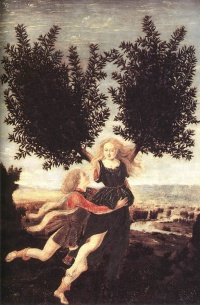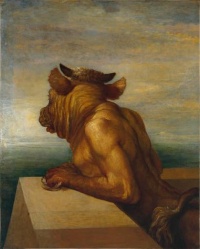Greek mythology
From The Art and Popular Culture Encyclopedia

|
"In his dialogue titled Protagoras, Plato asserts that the gods created humans and all the other animals, but it was left to Prometheus and his brother Epimetheus to give defining attributes to each. As no physical traits were left when the pair came to humans, Prometheus decided to give them fire and other civilizing arts." --Sholem Stein |
|
Related e |
|
Featured: |
Greek mythology is the body of stories belonging to the Ancient Greeks concerning their gods and heroes, the nature of the world and the origins and significance of their own cult and ritual practices. Modern scholars refer to the myths and study them in an attempt to throw light on the religious and political institutions of Ancient Greece and on the Ancient Greek civilization, and to gain understanding of the nature of myth-making itself.
The Greek gods, unlike the gods and goddesses of many other cultures and certainly unlike the gods of contemporary monotheistic faiths, are very similar to human beings. They fight, they lie, they make war, have adulterous relationships and experience the entire gamut of human emotions. The Greek deities were not especially moral beings - a far cry from the moral perfection ascribed to the Christian god.
Contents |
Motifs in Western art and literature
The widespread adoption of Christianity did not curb the popularity of the myths. With the rediscovery of classical antiquity in the Renaissance, the poetry of Ovid became a major influence on the imagination of poets, dramatists, musicians and artists. From the early years of Renaissance, artists such as Leonardo da Vinci, Michelangelo, and Raphael, portrayed the pagan subjects of Greek mythology alongside more conventional Christian themes. Through the medium of Latin and the works of Ovid, Greek myth influenced medieval and Renaissance poets such as Petrarch, Boccaccio and Dante in Italy.
In Northern Europe, Greek mythology never took the same hold of the visual arts, but its effect was very obvious on literature. The English imagination was fired by Greek mythology starting with Chaucer and John Milton and continuing through Shakespeare to Robert Bridges in the 20th century. Racine in France and Goethe in Germany revived Greek drama, reworking the ancient myths. Although during the Enlightenment of the 18th century reaction against Greek myth spread throughout Europe, the myths continued to provide an important source of raw material for dramatists, including those who wrote the libretti for many of Handel's and Mozart's operas. By the end of the 18th century, Romanticism initiated a surge of enthusiasm for all things Greek, including Greek mythology. In Britain, new translations of Greek tragedies and Homer inspired contemporary poets (such as Alfred Lord Tennyson, Keats, Byron and Shelley) and painters (such as Lord Leighton and Lawrence Alma-Tadema). Christoph Gluck, Richard Strauss, Jacques Offenbach and many others set Greek mythological themes to music. American authors of the 19th century, such as Thomas Bulfinch and Nathaniel Hawthorne, held that the study of the classical myths was essential to the understanding of English and American literature. In more recent times, classical themes have been reinterpreted by dramatists Jean Anouilh, Jean Cocteau, and Jean Giraudoux in France, Eugene O'Neill in America, and T. S. Eliot in Britain and by novelists such as James Joyce and André Gide.
Source texts of Greek mythology
- Virgil, Aeneid III.19-68
- Homer, Iliad XVI.717-718
- Solinus, De vita Caesarum X.22
- Lactantius, Divinae institutions I.22
- Pomponius Mela, De chorographia II.26
- Ovid, Metamorphoses XIII.423-450, 481-571
Episodes
See also
- Classical mythology
- Greek mythology in western art and literature
- Greek mythology in popular culture
- Metamorphoses
- Loves of the gods
- List of films based on Greco-Roman mythology

.jpg)
_-_Odilon_Redon.jpg)


